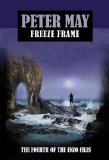Summary | Excerpt | Reviews | Beyond the Book | Readalikes | Genres & Themes | Author Bio

The Fourth of the Enzo Files
by Peter May
As the Citröen came round the bend behind him, he saw the
driver’s face, caught in a brief flash of sunlight, like a photograph
engraving itself on Yves’ retinas. A familiar face. Round. Bald.
But familiar from where? He had no idea. He only knew that
he had seen it before. He could see the shadows of other men
in the car, and suspicion burgeoned quickly into certainty and
then fear. They had found him. They were following him. And
sooner or later they would come for him.
With a deep inward sigh, Yves knew that it was time to move
on.
A window along one side of his office looked down on to the floor
of the indoor fishmarket below. It was a huge shed where long
wooden palettes laid out on concrete displayed the day’s catch.
8 Peter May
Sardines, mackerel, dorade, mullet, plaice. Boxes and boxes of
them neatly arranged in oblong enclosures all across the trading
floor, where buyers clustered to barter with white-coated marketeers.
Raised voices floated up through the stench of fish and salt
to rattle the window frames. Yves paused for only a moment to
consider that it was the last time that he would gaze upon this
scene. He had grown to love the smell and sights and sounds of
the market during the nearly ten years he had worked his way
up from humble trader to market manager. Considering that he
had known nothing of fish or fishermen when he arrived from
Munich, his ascent had been little short of meteoric. But his
intelligence and ability to think on his feet had quickly singled
him out from the crowd, and his bosses had not been slow to
spot it. Increased responsibility had followed. Promotion. First
to the running of the trading floor, then to assistant manager.
And when finally his mentor had retired last year, stepping up
and into his shoes had seemed the most natural progression to
everyone concerned.
He turned away from the window, heavy with disappointment
and regret. Each time, it seemed, that his future looked
set, fate stepped in with a change of plan.
Run, Erik, run. Start again. Rebuild your life. But don’t ever
think you are safe. Never think for a moment that I am not right
behind you, ready to pounce.
He removed the picture from the wall above his desk, and
spun the dial on the safe behind it left and right. He heard the
tumblers falling into place as he stopped it at the final digit, and
the heavy door swung open. Inside lay bundles of documents,
official papers, a cash box containing several hundred Dirham.
And right at the back, a padlocked metal case, which he removed
and placed on his desk.
A small key on his car key ring unlocked the padlock and he
threw back the lid. Inside were the passports they had given him.
All the paperwork he would require when the time came. He
took them out and slipped them into a compartment of his briefcase,
and picked up an old black and white photograph. Magda
and the children. He felt a stab of self-pity, almost remorse. In
all these years he had hardly ever allowed himself to even think
what might have become of them. And now wasn’t the time.
It followed the papers into his briefcase, and he picked up the
Walther P38 that he had taken from his desk drawer that fateful
December night in Munich all those years before. Occasionally
oiled, but never fired, in anger or self-defence. He dropped that,
too, into the briefcase.
He looked up startled as the door opened. His secretary was a
plump lady in her late thirties, dowdy and unattractive, with olive
skin and dark eyes. Her long hair was tied up inside a black scarf.
“What is it, Aqila?” The sharpness of his tone startled her.
“I’m sorry, Monsieur Vaurs.” Her apology was both defensive
and hostile. They had never got on. “I have Monsieur Cattiaux
from the bank on the line. Do you want to take his call?”
“No, tell him to call this afternoon.” His French, after all this
time, was almost without accent and would never stand out in
a country where almost everyone spoke it as a second language.
Excerpted from Freeze Frame by Peter May. Copyright © 2010 by Peter May. Excerpted by permission of Poisoned Pen Press. All rights reserved. No part of this excerpt may be reproduced or reprinted without permission in writing from the publisher.
Children are not the people of tomorrow, but people today.
Click Here to find out who said this, as well as discovering other famous literary quotes!
Your guide toexceptional books
BookBrowse seeks out and recommends the best in contemporary fiction and nonfiction—books that not only engage and entertain but also deepen our understanding of ourselves and the world around us.